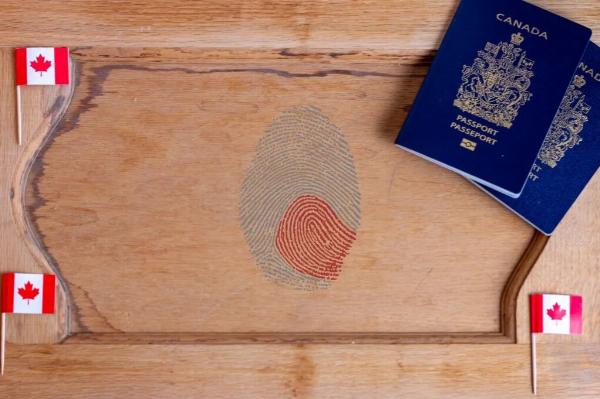Fingerprints for Canadian Citizenship - A Comprehensive Guide

Strong 8k brings an ultra-HD IPTV experience to your living room and your pocket.
Fingerprinting is an essential part of many official processes in Canada, including applications for Canadian citizenship. This guide will provide a thorough explanation of why fingerprints are required, how they are processed, and what applicants need to know to complete this critical step in the citizenship application process. Whether you're applying for citizenship through naturalization or seeking it on other grounds, understanding the fingerprinting process will help ensure that your application proceeds smoothly.
Why Are Fingerprints Required for Canadian Citizenship?
The Government of Canada requires fingerprints from applicants to conduct background checks. These checks are essential for ensuring that those seeking citizenship do not have criminal records or are not involved in activities that could compromise the safety or security of Canada. Specifically, fingerprints help Canadian authorities check for:
Criminal History: The primary reason fingerprints are collected is to verify that the applicant does not have a criminal record that could prevent them from obtaining citizenship.
Identity Verification: Fingerprints are used to confirm the applicant’s identity and ensure that the person applying for citizenship is the same person who has been living in Canada as a permanent resident.
International Background Checks: For individuals who have lived in multiple countries, fingerprints may be shared with international agencies to check for criminal records or security issues outside of Canada.
Prevention of Fraud: By using biometric data, including fingerprints, the Canadian government can prevent individuals from applying for citizenship under multiple identities or using false documents.
Who Needs to Provide Fingerprints?
Fingerprinting is not required for all applicants seeking Canadian citizenship. Whether or not you will be asked to provide fingerprints depends on several factors:
Adults (18 and older): Most adult applicants for Canadian citizenship may be asked to provide fingerprints, especially if there is a need to verify identity, conduct security checks, or investigate potential criminal records.
Minors (Under 18): Minors applying for citizenship are typically not required to provide fingerprints unless there are specific reasons to do so, such as concerns about identity or criminal background.
Permanent Residents: Permanent residents applying for citizenship will need to provide fingerprints if requested by Immigration, Refugees, and Citizenship Canada (IRCC) as part of the background check process.
Individuals with Past Criminal Convictions: If you have a criminal record, you will likely be asked to provide fingerprints to assist in further investigation, especially to assess whether your conviction affects your eligibility for citizenship.
Applicants with Name or Identity Changes: If you have changed your name or other identifying details during your stay in Canada, fingerprinting may be required to ensure that there is no confusion or fraud.
When Will You Be Asked to Provide Fingerprints?
The request for fingerprints may come at various stages in the citizenship application process:
At the Time of Application: In some cases, fingerprints may be requested when you first submit your application. This is often the case for individuals who need to undergo a more thorough background check due to prior criminal history or residency in multiple countries.
After Initial Review: You may also be asked to provide fingerprints after your application has been reviewed. This is typically when there is a need for further clarification or verification of your identity or background.
During Citizenship Testing or Interview: Some applicants may be required to provide fingerprints at the time of their citizenship test or interview, especially if issues arise related to the authenticity of documents or identity concerns.
Request via Mail: IRCC will usually send a formal request for fingerprints via mail. The request will include instructions on where and how to provide the necessary biometric data.
How to Provide Fingerprints for Canadian Citizenship
Once you receive a request for fingerprints from IRCC, you will need to follow the appropriate steps to ensure that the process is completed correctly:
Contact an Accredited Fingerprinting Agency: You must have your fingerprints taken by an agency that is accredited by the Royal Canadian Mounted Police (RCMP). Many third-party fingerprinting services across Canada offer digital fingerprinting, which is faster and more reliable than traditional ink-based methods. You can find a list of accredited agencies on the RCMP website.
Digital Fingerprinting vs. Ink Fingerprinting: Digital fingerprinting is the preferred method because it is quicker and more accurate. However, if digital fingerprinting is not available in your location, ink fingerprinting may be accepted. The processing time for ink fingerprints can be longer, as they must be manually scanned and processed.
Submit the Required Documentation: When providing your fingerprints, you will need to bring specific documentation with you. This typically includes:
• A valid government-issued photo ID (passport, permanent resident card, etc.)
• A copy of the fingerprint request letter from IRCC
• Payment for the fingerprinting service (if applicable)
Fingerprinting at the RCMP: In some cases, individuals may be asked to have their fingerprints taken directly at an RCMP detachment. This is more common for individuals with criminal records or other special circumstances.
Processing Time for Fingerprints
Once your fingerprints have been submitted to the appropriate agency, they are forwarded to the RCMP for processing. The length of time it takes for your fingerprints to be processed and the results sent to IRCC can vary depending on several factors:
Digital Fingerprinting: If you provided digital fingerprints, the processing time is usually between 3 to 10 business days.
Ink Fingerprinting: If you provided ink fingerprints, the processing time is longer, typically ranging from 10 to 120 days, depending on the volume of applications and whether there are any issues with the quality of the fingerprints.
Criminal Records Check: If you have a criminal record or if there are concerns about your background, the processing time for fingerprints may be extended, as additional checks will need to be performed.
International Applicants: For applicants who have lived in multiple countries, background checks in other jurisdictions may take time, which can delay the fingerprint processing.
Common Issues and Troubleshooting
Although fingerprinting is generally a straightforward process, there are some common issues that applicants may encounter:
Poor Quality Fingerprints: If your fingerprints are not clear, the RCMP may reject them, and you will need to have them retaken. This is more common with ink fingerprints but can also occur with digital ones.
Incorrect Documentation: Ensure that you bring the correct identification and the fingerprint request letter to avoid delays.
Processing Delays: High demand, especially in larger cities, can sometimes lead to delays in fingerprint processing. Check with your fingerprinting agency to confirm their current processing times.
Rejected Fingerprints: In rare cases, fingerprints may be rejected due to technical issues or poor quality. If this happens, IRCC will notify you, and you will need to resubmit your fingerprints.
Costs Associated with Fingerprinting for Canadian Citizenship
There are fees associated with the fingerprinting process, which vary depending on the method of fingerprinting and the agency providing the service. Here’s a breakdown of the typical costs:
Fingerprinting Fees: Agencies generally charge between CAD 50 to CAD 100 for digital fingerprinting services. Ink fingerprinting services may cost more due to the manual process involved.
RCMP Processing Fees: There may be additional fees for processing fingerprints, especially if criminal background checks are required. Typically, this fee is included in the overall cost of the fingerprinting service.
Additional Fees for International Applicants: If you are submitting fingerprints from outside of Canada, additional costs may apply for shipping and international processing.
Fingerprinting is a crucial part of the Canadian citizenship application process, particularly for conducting background checks and verifying the identity of applicants. By understanding when fingerprints are required, how to provide them, and what to expect during the processing period, applicants can avoid unnecessary delays and ensure that their application proceeds smoothly. Following the instructions provided by IRCC and choosing a reliable fingerprinting agency are essential steps in this process. While fingerprinting may seem like a minor step, it plays a significant role in maintaining the security and integrity of Canada's immigration and citizenship system.
Note: IndiBlogHub features both user-submitted and editorial content. We do not verify third-party contributions. Read our Disclaimer and Privacy Policyfor details.


